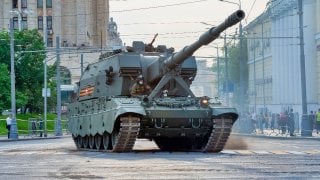Russia’s Imperial Ambitions: The Long-Term Threat to NATO
Once the artillery and glide bombs stop falling in Ukraine, Russia will still pose a significant threat to the West and, of course, NATO. How much of a threat depends upon how the war ends.
Russia is a Specter that Will Haunt the West for the Foreseeable Future: Once the artillery and glide bombs stop falling in Ukraine, Russia will still pose a significant threat to the West. How much of a threat depends upon how the war ends.
When the fighting stops Russia will retain a sizeable population, albeit with deep demographic issues, substantial capabilities, and most damningly, an unbridled imperial mindset.
Putin has been willing to sacrifice an appalling number of human lives and large-scale loss of equipment to continue to prosecute the war against Ukraine. Yes, the depleting of Soviet stocks and Russia’s reliance upon North Korean shells and now, soldiers to shore up its flagging military, to say nothing of its dependence on China and Iran, isn’t exactly a show of strength.
Yet, despite these weaknesses, the Russian military grinds on. Rosy projections about future Russian capacity to wage war from earlier in the full-scale war have fallen aside to more sobering recent analysis. Just this week NATO SACEUR General Christopher G. Cavoli remarked, “At the end of the war in Ukraine, no matter how it looks, the Russian army will be stronger than it is today. These forces will be on the border of our alliance. They are commanded by the same people who already see us as enemies and will later be dissatisfied with the way the war went. So we will have an opponent with real skills, a mass of troops, and clear intentions."
It is clear this is also how NATO allies most at risk from Russia also see it. The Baltic states are reinforcing their borders, NATO’s newest additions Finland and Sweden are doubling down on civil defense, and every NATO member state that shares a land border with Russia is investing in defense well beyond the alliance's two percent benchmark, with Poland leading the way at a whopping 4.12 percent of GDP.
The most likely scenario we face is that Russia will come out of war bitter at the cost, with an increasingly cogent stable of autocratic allies, and an economy geared towards confrontation.
We know that Putin has mortgaged Russia’s economic future for its genocidal project of the present. Of course, the Russian economy even before February 2022 was not exactly a star. Still, the Kremlin is now staring down a dismal economic future. Its humming war industry will demand to be fed, yet Russian arms exports have been reeling.
Public discontent is likely to grow as government subsidies and transfer payments dry up. This cauldron of misery will make Russia even more aggressive. For Putin or his successor, the only surefire way to deflect blame is to whip up patriotic fervor and distract the public from the source of their discontent.
We can also expect that whoever commands power once the war against Ukraine comes to an end will share an imperial drive. It is a fool’s errand to expect Russia to change overnight. The successor of Putin, wherever he goes, will most likely come from within his inner circle, a person who shares a similar outlook.
Many Americans also fail to appreciate that despite a recent softening, the public by and large supports the war. It is not only Putin’s war but Russia’s war. This is not to say there are no outliers. Since the start of the full-scale invasion, as many as one million Russians may have left the country, some of them due to opposition to the war.
That is to say, some of the Russian emigres are exactly the sort of people most inclined towards envisioning a different track for their nation than the one the country is currently sprinting on.
As a victor of WWII, Russia, and formerly the Soviet Union, never had to face a societal reckoning for its crimes, both before, during, and after that conflict. As such, militaristic imperialism in Russia remains alive and well. In comparison, in Germany, even today, the weight of history explains in large part the continued hesitancy of the nation to become a military power, despite the persistent prodding of the U.S.
These factors paint a bleak picture of a foreseeable future where Russia is very likely to remain a clear threat to the U.S. and its allies. The level of threat can, however, be reduced, if Russia is handed a strategic defeat in Ukraine. Anything less, and the Kremlin will be emboldened.
Eventually, Russia will try and complete its destruction of Ukraine and may be tempted to risk a frontal assault on NATO. Putin already views the ongoing war not only in terms of Russia versus Ukraine but as one against the U.S. and NATO. If he comes away believing he has faced down the West in Crimea and the Donbas, he will believe he can do it again on the territory of a NATO ally.
The persistence of the threat from Russia should underscore to Western leaders the stakes of the present moment. There is still time to hand Russia a strategic defeat in Ukraine, but the hour grows later by the day.
About the Author: Daniel Kochis
Daniel Kochis is a senior fellow in the Center on Europe and Eurasia at Hudson Institute. He specializes in transatlantic security issues and regularly publishes on United States policy in Europe; NATO, Baltic, and Nordic dimensions of collective defense; and Arctic issues. Prior to joining Hudson, Mr. Kochis spent 11 years with the Heritage Foundation’s Margaret Thatcher Center for Freedom, most recently as a research fellow in European affairs. There, he served as lead Europe analyst, authoring hundreds of publications and for a decade writing the Europe chapter of Heritage’s Index of US Military Strength.
Image Credit: Shutterstock.

